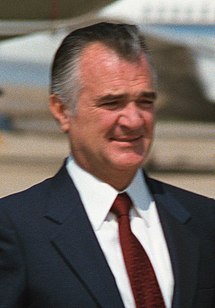Miguel de la Madrid
| Miguel de la Madrid | |
|---|---|

In Zurich 1985
|
|
|
52nd President of Mexico |
|
|
In office December 1, 1982 – November 30, 1988 |
|
| Preceded by | José López Portillo |
| Succeeded by | Carlos Salinas de Gortari |
| Director of the Fondo de Cultura Económica | |
|
In office 1990–2000 |
|
| Preceded by | Enrique González Pedrero |
| Succeeded by | Gonzalo Celorio Blasco |
| Secretary of Programming and the Budget | |
|
In office May 16, 1979 – September 30, 1981 |
|
| President | José López Portillo |
| Preceded by | Ricardo García Sainz |
| Succeeded by | Ramón Aguirre Velázquez |
| Personal details | |
| Born |
Miguel de la Madrid Hurtado December 12, 1934 Colima, Mexico |
| Died | April 1, 2012 (aged 77) Mexico City, Mexico |
| Resting place | Iglesia de Santo Tomás |
| Nationality | Mexican |
| Political party | Institutional Revolutionary Party |
| Spouse(s) | Paloma Cordero Tapia (m. 1959–2012) |
| Children | Enrique de la Madrid Cordero |
| Alma mater |
National Autonomous University of Mexico John F. Kennedy School of Government at Harvard University |
Miguel de la Madrid Hurtado (Spanish pronunciation: [miˈɣel delamaˈðɾið uɾˈtaðo]; December 12, 1934 – April 1, 2012) was a Mexican politician affiliated with the Institutional Revolutionary Party (PRI) who served as the 52nd President of Mexico from 1982 to 1988. His presidency was both famous and notorious for introducing the sweeping neoliberal economic policies to Mexico, and for his administration's slow response to the 1985 Mexico City earthquake that occurred at the height of his administration.
Miguel de la Madrid was born in the city of Colima, Colima, Mexico. He was the son of the late Miguel de la Madrid Castro a notable lawyer, who died when Miguel was only two, and his mother Alicia Hurtado. His grandfather was Enrique O. de la Madrid who was governor of the state of Colima.
Miguel de la Madrid graduated with a bachelor's degree in law from the National Autonomous University of Mexico (UNAM) and received a master's degree in Public Administration from the John F. Kennedy School of Government at Harvard University, in the United States.
He worked for Mexico's central bank and lectured in law at UNAM before securing a position at the Secretariat of Finance in 1965. Between 1970 and 1972, he was employed by Petróleos Mexicanos, Mexico's state-owned petroleum company, after which he held several other bureaucratic posts in the government of Luis Echeverría. In 1976, he was chosen to serve in José López Portillo's cabinet as secretary of budget and planning.
...
Wikipedia
